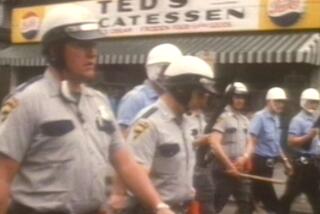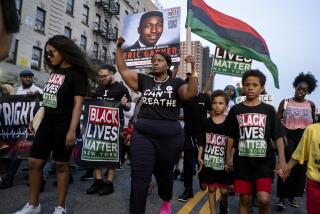Is it about race? You bet it is
For years, it has been said that this country needs an honest discussion about race. Well, as a result of the uproar over recent deaths of black males at the hands of police, we may finally be getting it.
Protests on city streets from coast to coast have sparked heated exchanges in the media that are bringing into the light of day attitudes and perceptions that have long been kept in the shadows. Many white Americans are hearing for the first time something they should have known: African Americans in poorer neighborhoods -- and in not-so-poor places as well -- live with a distrust and fear of encounters with the police because so many of even the most law-abiding among them have had negative encounters with cops. And many black Americans are hearing something from white conservatives that is baffling: the assertion that “this is not about race.”
Only in the most narrow reading of the events that have captured the headlines in Ferguson, Mo., New York City and Cleveland is it not about race. In Ferguson and in New York, individuals who appeared to be resisting arrest were killed by police and, in Cleveland, a person holding a pellet gun was shot and killed. They could have been white or Chinese or Eskimo; the cops were just doing their job -- or so the argument goes.
But add a little context and race suddenly matters. Michael Brown, the teenager in Ferguson who got into an altercation with a cop; Eric Garner, the Staten Island man who allegedly was selling cigarettes on a street corner; and Tamir Rice, the Cleveland 12-year-old who was fiddling around with a pellet gun in a city park, are new numbers in federal statistics that, according to a ProPublica study, show young black males are 21 times more likely to be killed by police than young white males.
Put another way, if Brown, Garner and Rice had been white, their activities might have been much less likely to be met with deadly force.
That does not mean cops are intentionally targeting black males, but it does mean policing is quite often conducted at a different level in many black communities. One obvious reason for that is as clear as the difference between Compton and Beverly Hills: a starkly higher crime rate and gang violence. Cops go where the trouble is and, because they feel more endangered themselves, they may be quicker to ratchet up their own level of violence. It doesn’t take long before a wary police officer starts seeing a potential felon in every black face and starts treating the innocent as if they are guilty -- and a deadly spiral begins.
Add another level of context: In these troubled communities incomes are lower, jobs are more scarce, business activity is more depressed, schools are not as good, two-parent families are more rare. That present-day social malaise is not just the result of bad personal choices, it is the legacy of many long decades of racial discrimination and political neglect.
Imagine if black veterans of World War I and World War II had been welcomed home as heroes instead of being dishonored and cast back into a world of segregation, lynching and redlining. Perhaps their grandchildren and great-grandchildren would not have grown up estranged from the center of American life. Imagine if the black men and women who migrated from the South in the 1930s and ‘40s had been allowed to buy homes in good neighborhoods on fair terms and if career ladders had not been cut off at the first rungs. They would have had the chance to amass a small share of personal wealth, just like white Americans were able to do, and, as a result, their descendants might not now be struggling with economic insecurity.
Yes, huge progress has been made; that is undeniable. Slavery is long gone, Jim Crow is dead and a black family resides in the White House. Yet a significant number of black citizens still experience life in America very differently than most white Americans. Is that about race? You bet it is -- and it is good we are finally talking about it.
More to Read
A cure for the common opinion
Get thought-provoking perspectives with our weekly newsletter.
You may occasionally receive promotional content from the Los Angeles Times.











